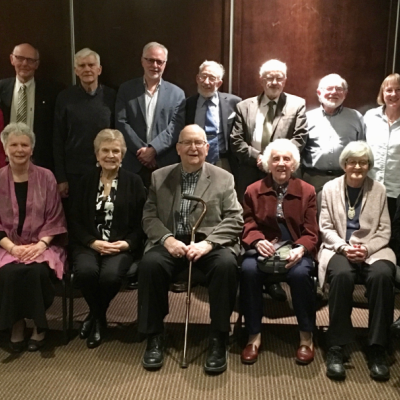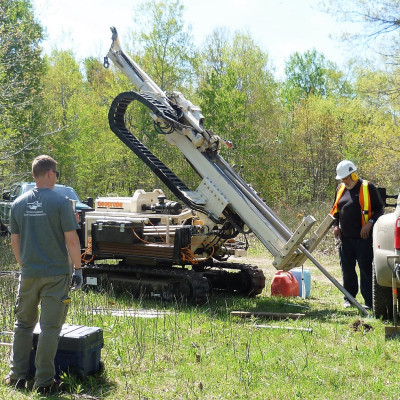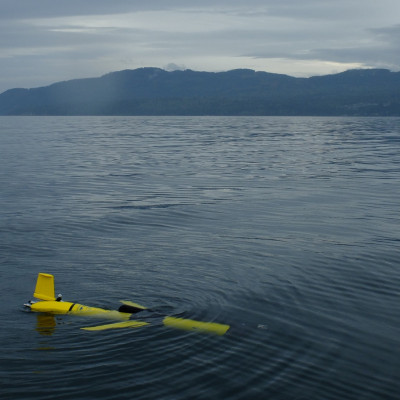News
Stay up-to-date with what's happening in EOAS
Doug Oldenburg and UBC-GIF recipients of the 2017 SEG Distinguished Achievement Award
The award is given “from time to time to a company, institution, or other organization for a specific technical contribution or contributions that have … substantially advanced the science of exploration geophysics”. With 27,000 members from 128 countries, SEG is the world’s largest society dedicated to applied geophysics. Doug and UBC-GIF were given the award for their innovation and continuing development of computerized inversion methodologies to solve applied problems for the mineral, geotechnical and environmental industries, and to make that research available to universities and industry. In doing so, they have been spectacularly successful, having developed 16 software programs that are licensed through UBC. The extent of these licenses is truly amazing – 350 academic licenses (no charge), 152 commercial licenses and 7 commercial government licenses. To complement their developments, Doug and UBC-GIF have implemented an OUTREACH program that includes case history studies to demonstrate applicability, a web site for tutorial/information on geophysical inversion for both non-specialists and specialists, and a CD ROM “book” about their inversion techniques and how to apply them. For more information about UBC-GIF, see https://gif.eos.ubc.ca/. EOAS, the Faculty of Science and UBC congratulate Doug and UBC-GIF on the SEG award and the accomplishments it represents.
GEOLOGY RETIREES DINNER
Retired UBC geology faculty and partners gathered for dinner at the Shaughnessy Golf Clubhouse on Tuesday 25th April 2017. Photo shows those present: front row Meg Brown, Mackie Chase, Rosalie Soregaroli, Jim Murray, Joan Ross, Evelyn Murray, and Kate Gordanier-Smith; back row Sylvia and Alastair Sinclair, Dick Chase, Paul Smith, Peter Read, Colin Godwin, Carlo and Norma Giovanella, and Pattie Godwin (Jane Ross took the photo). We all enjoyed the good food and gossiping about old times, relatives and friends. We thank Sylvia Sinclair for arranging the venue.
ENVR 400 students win first prize for poster at sustainability event
Congratulations to Emma Hendry, Amani Olia, Kimberly San, and Cherry Tam for winning first prize for their poster at Hubbub, the City of Vancouver City Studio event on April 7th, 2017. This team of ENVR 400 students won for their poster about their year-long community project entitled "Branching Out: A Citizen Science Approach to Monitoring Vancouver's Urban Forests". They partnered with the City, and with teachers and students from Norma Rose Point School to (1) investigate park users' perceptions of urban forests and interest in citizen science, (2) develop and test urban forest monitoring activities designed for grade 3 students, and (3) combine results from surveys, activities, and teacher feedback to make recommendations on how the City could implement future citizen science programs targeting urban forests.
City Studio is "an innovation hub where City staff, students and community co-create experimental projects to make Vancouver more sustainable, liveable and joyful".
Brett Gilley awarded UBC Killam Teaching Prize
The Department is pleased to announce that Brett Gilley has been awarded a 2016-2017 UBC Killam Teaching Prize. The Killam Teaching Prize is awarded annually to faculty nominated by students, colleagues, and alumni in recognition of excellence in teaching. Brett will receive his award at the graduation ceremonies this spring. Congratulations Brett!
Groundwater monitoring for methane required near energy wells
A study published in Nature Geoscience indicates that when methane leaks from energy resource development such as fracking it is highly mobile in groundwater, potentially travelling far beyond a leaky well and posing a safety risk.
“Currently monitoring for gas leakage is conducted at ground surface next to an energy well, while the surrounding groundwater underneath isn’t usually monitored,” says lead author Aaron Cahill, a UBC researcher who conducted the study during his time as a Postdoctoral Fellow at the University of Guelph.
Besides posing an explosion risk and degrading groundwater quality, methane can contribute to climate change when released to the atmosphere. Ordinarily, researchers have focused on finding out if methane has leaked in an area, and finding the source of the leak. But Cahill and his colleagues took a different approach. They released a small amount of gas into the sub-surface and observed how it moved, how it impacted groundwater, and where it ended up. They discovered methane dissolved extensively into the groundwater.
John Cherry, a groundwater contamination expert with the University of Guelph who co-authored the study, says sealing energy wells thoroughly can be challenging and leaky wells are common. Even when leaks are fixed, the impact to groundwater is likely long-term.
“We require a more comprehensive approach which monitors both surface and groundwater for methane,” Cahill concluded.
The study has just been showcased in a feature article by UBC Science: https://science.ubc.ca/news/groundwater-monitoring-methane-required-near-energy-wells-ubc-researcher
Ocean gliders to study turbulence and whale habitat in Clayoquot Canyon
Autonomous instrument platforms are revolutionizing how we can observe the ocean. Recently a small fleet of gliders, low power underwater drone-like platforms, have been used to pioneer research in oceanography and ecology by collecting substantial new data for a multifaceted research project to help understand whale habitat, food sources, and the physical ocean processes that influence them. The purpose of the project is to identify and characterize whale habitat to mitigate the risk of ship strikes in Canadian coastal waters.
Participating in this research is Stephanie Waterman’s ocean glider group in EOAS, in collaboration with scientists from University of Victoria, Dalhousie University, Institute of Ocean Sciences, Ocean Networks Canada, and the Ocean Tracking Network. Together they deployed three autonomous underwater gliders in Clayoquot Canyon off the West coast of Vancouver Island in February 2017. This initiative is a part of the Marine Environmental Observation Prediction and Response (MEOPAR) Network’s Whale Habitat and Listening Experiment (WHaLE) project.
Submarine canyons, which are prevalent in this region, are known biological hotspots and feeding grounds for whales. Tara Howatt, a UBC PhD student working on the project, is examining oceanographic processes to understand why. The UBC glider was equipped with a turbulence profiler, which will be used to examine the relationship between zooplankton aggregations and oceanic turbulence. This unique data set is bridging gaps between physical and biological oceanography.
More information about the collaborative glider mission can be found in this news article: http://www.cbc.ca/news/canada/british-columbia/underwater-robots-map-grey-whale-habitat-off-vancouver-island-1.4013947
Pictured below from left to right: Tara Howatt (PhD student), Chris Payne (sea-going technician), and Benjamin Scheifele (PhD student)





